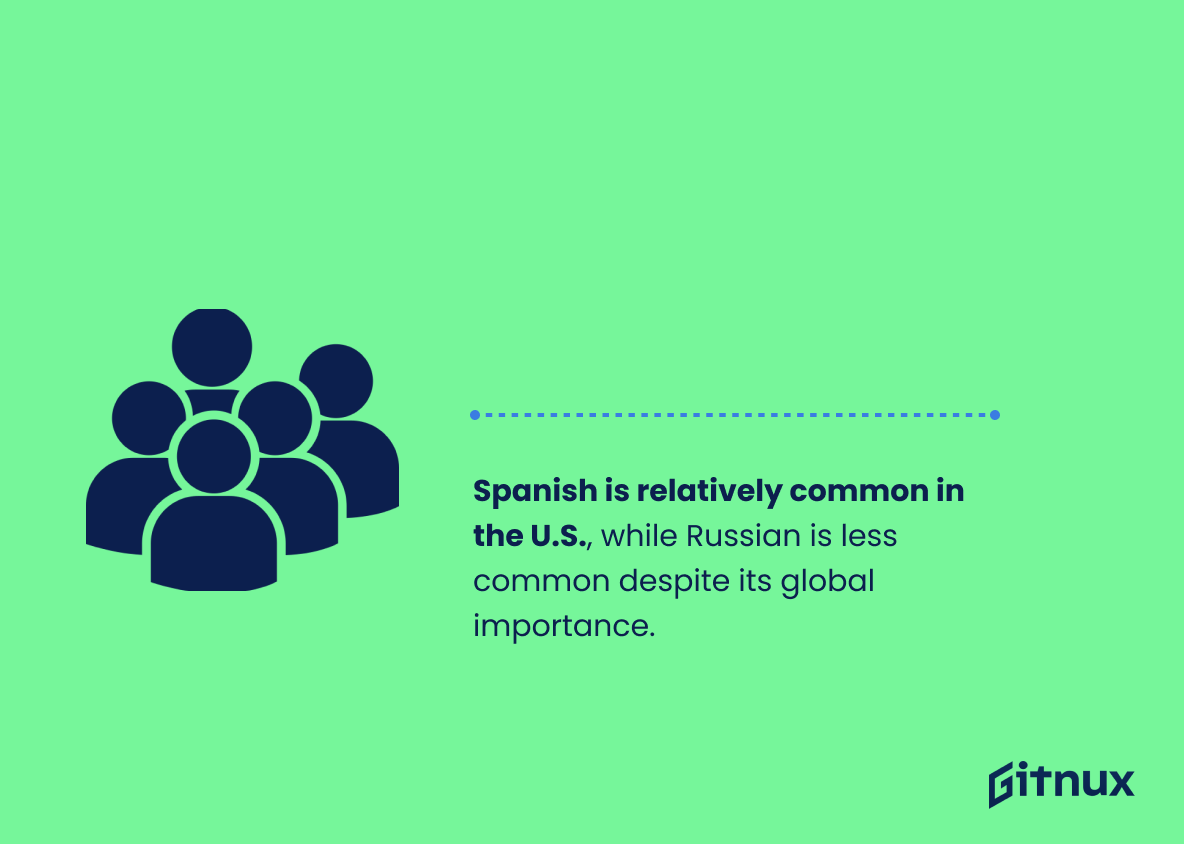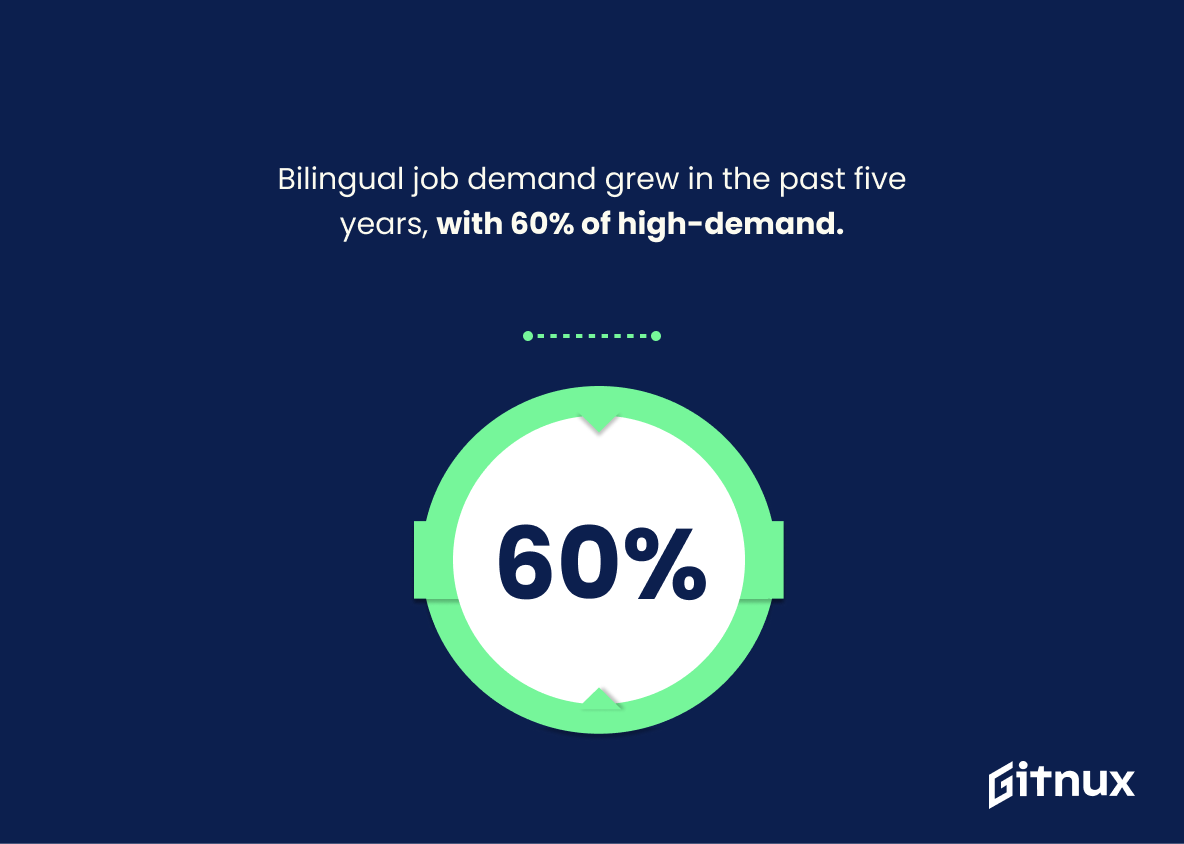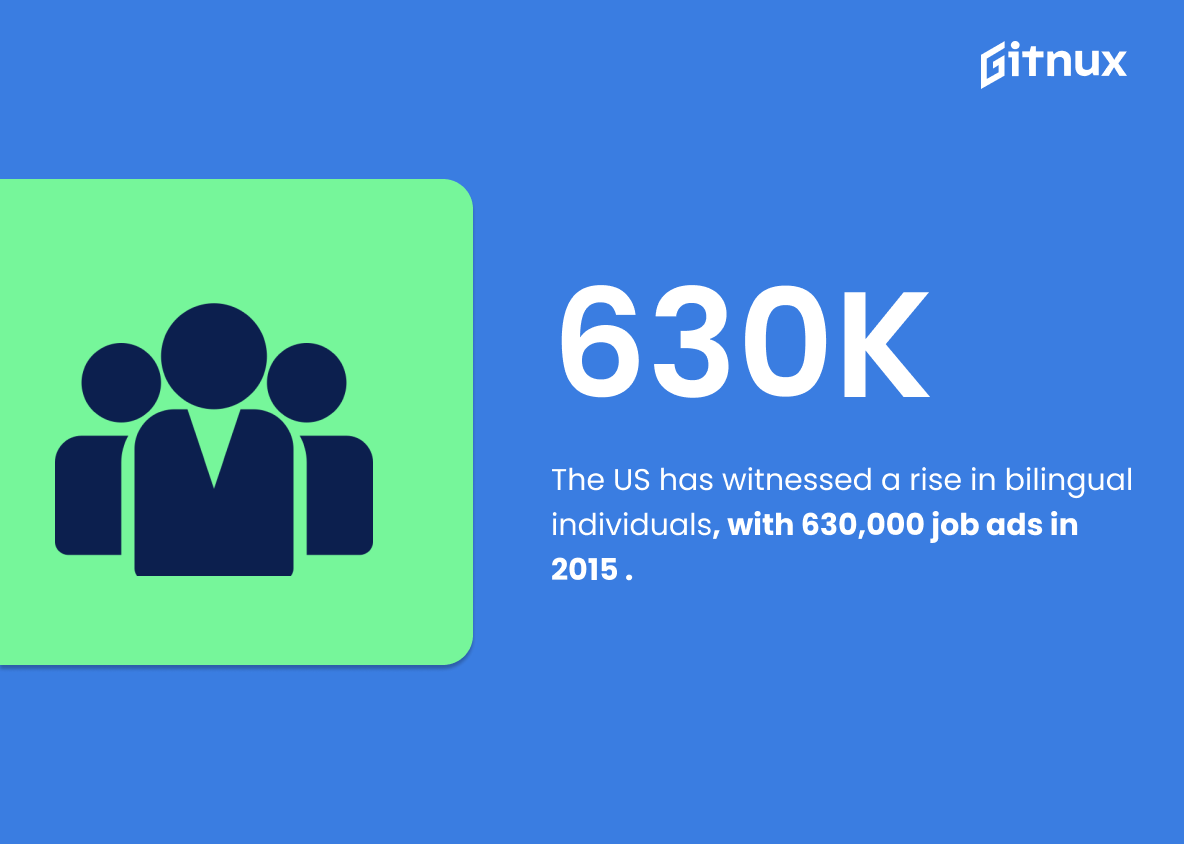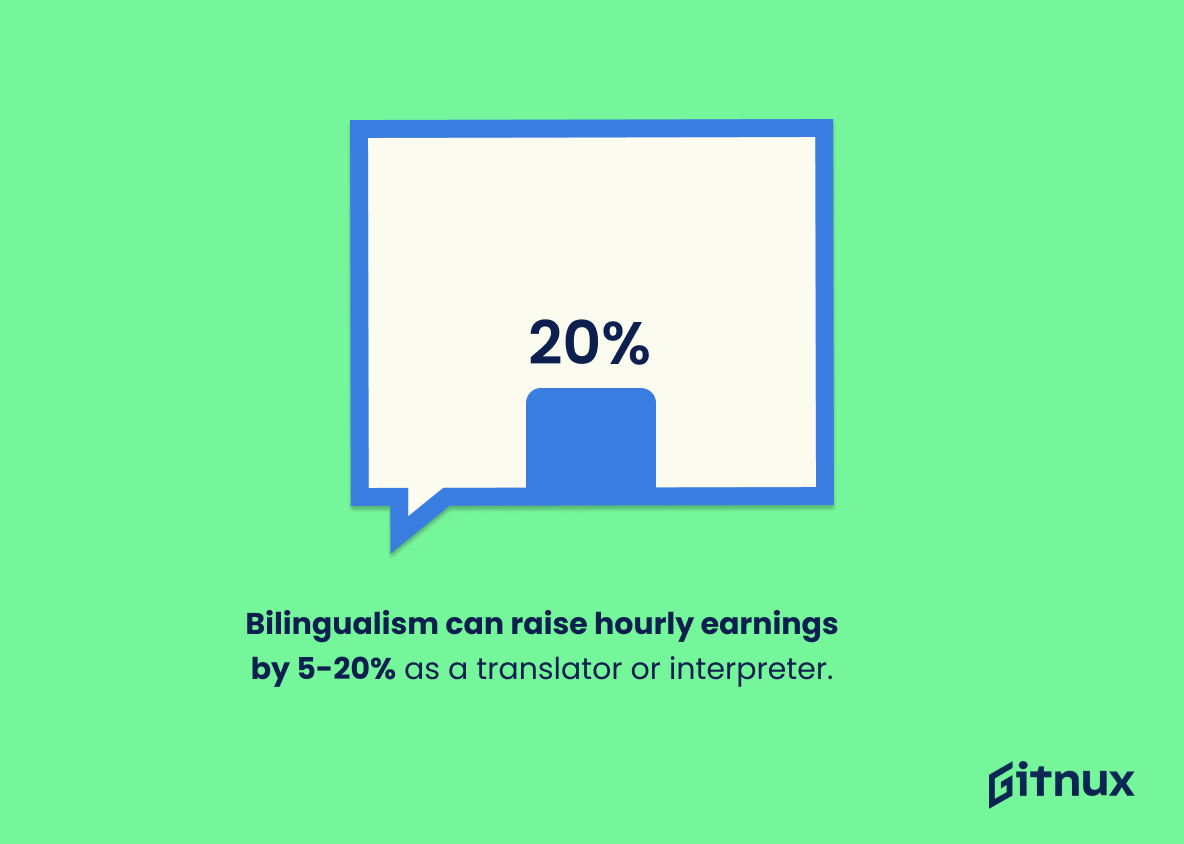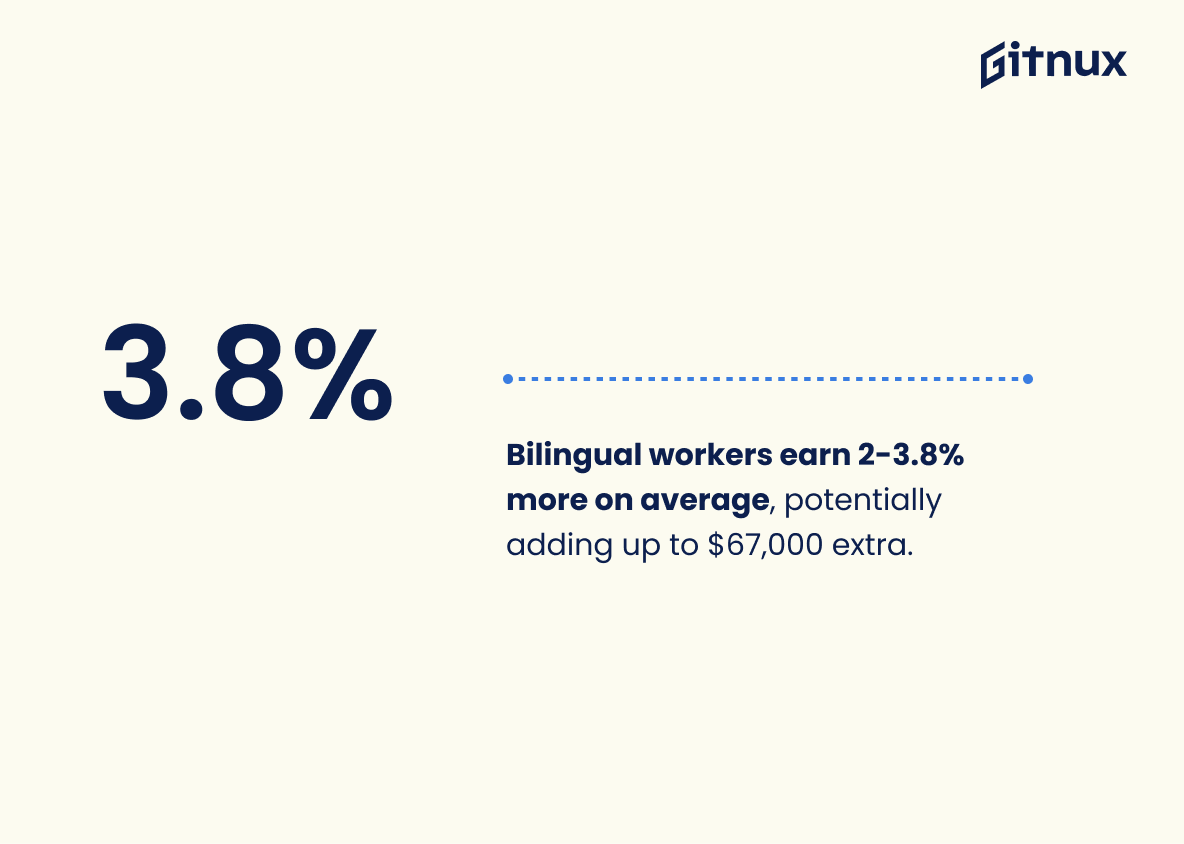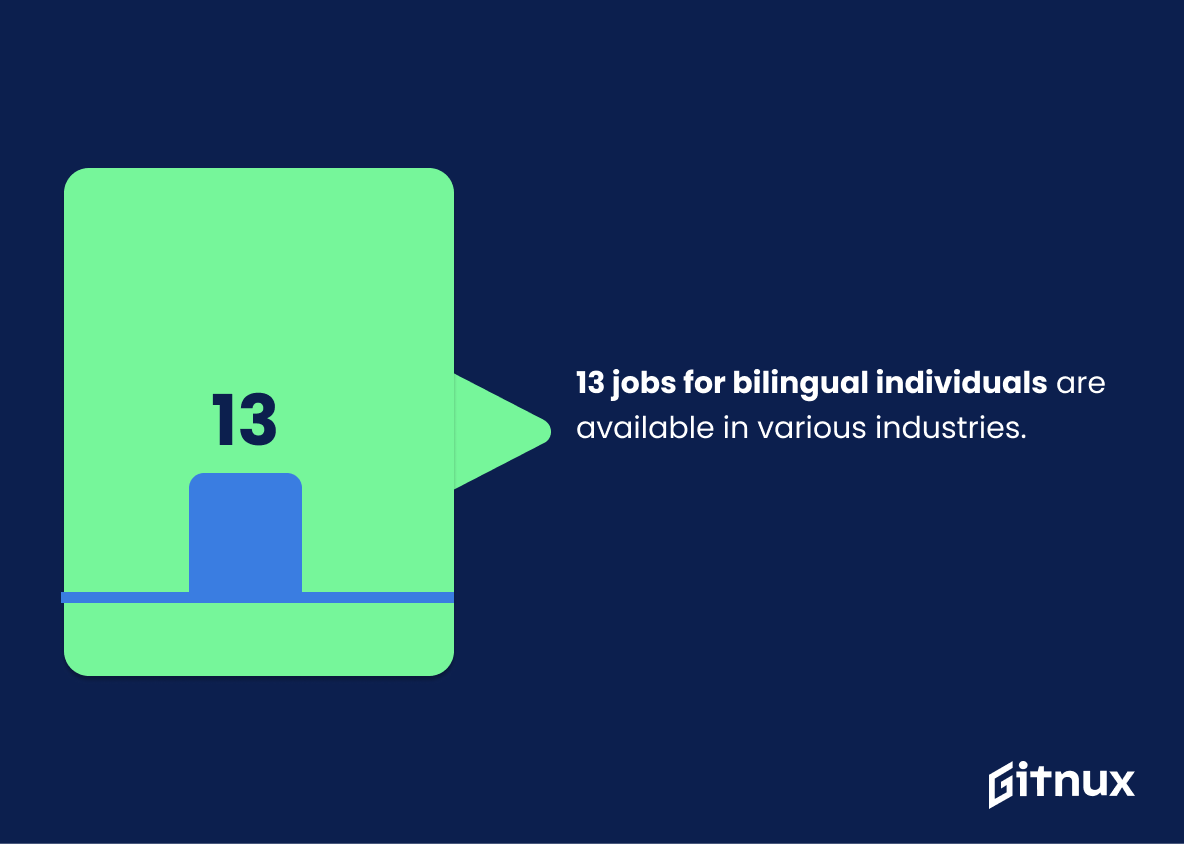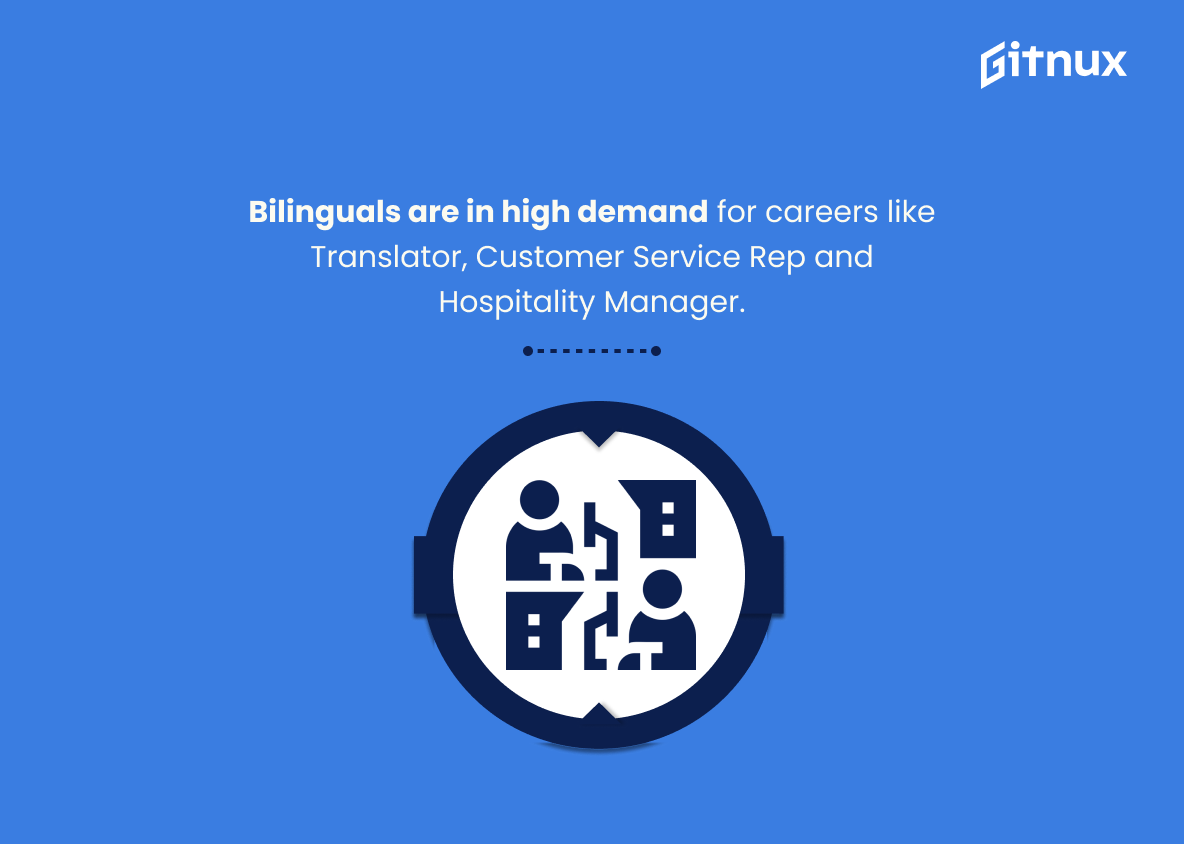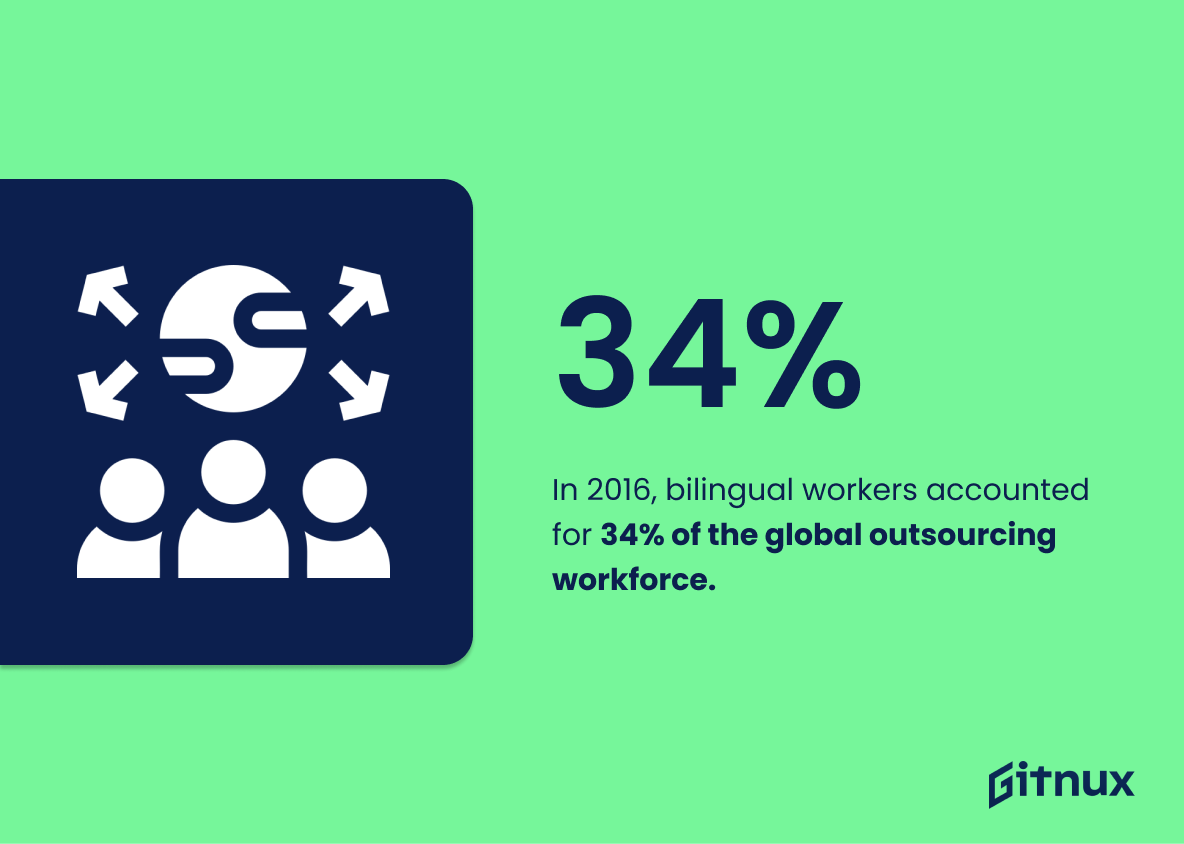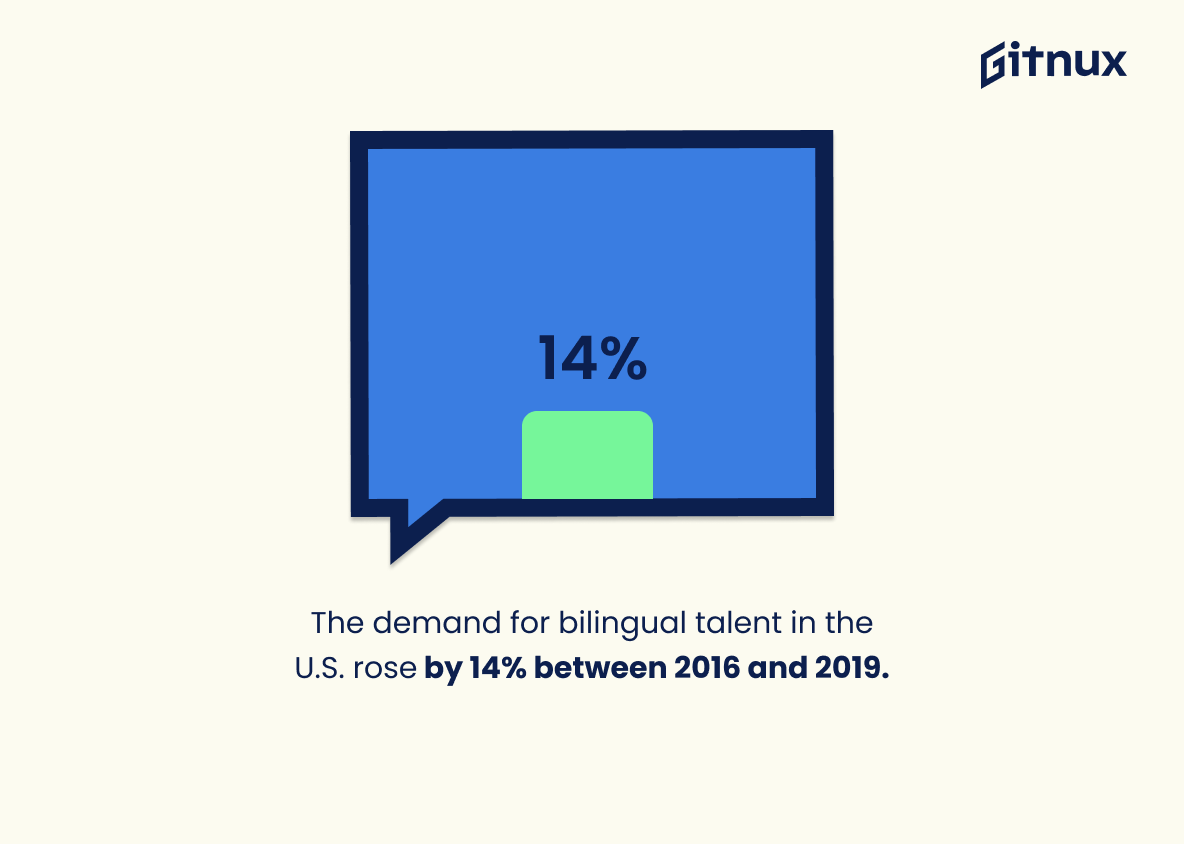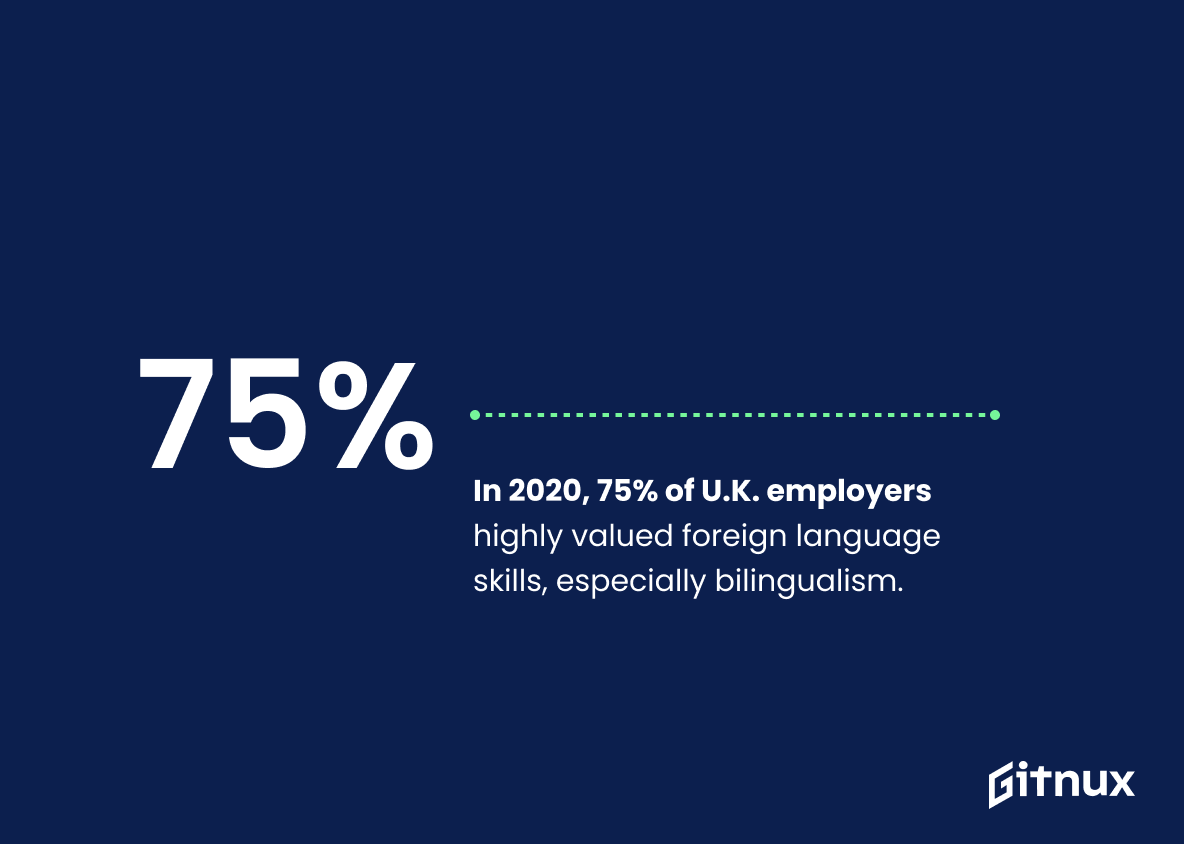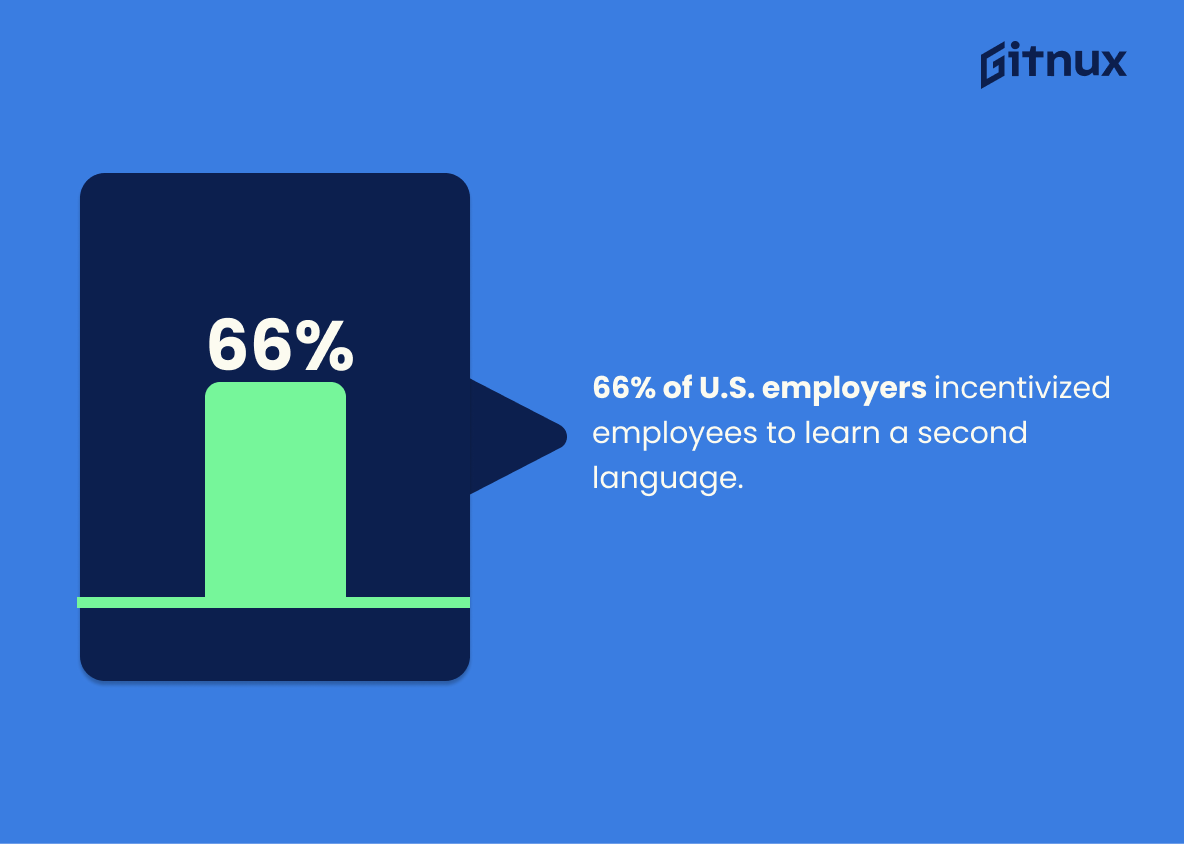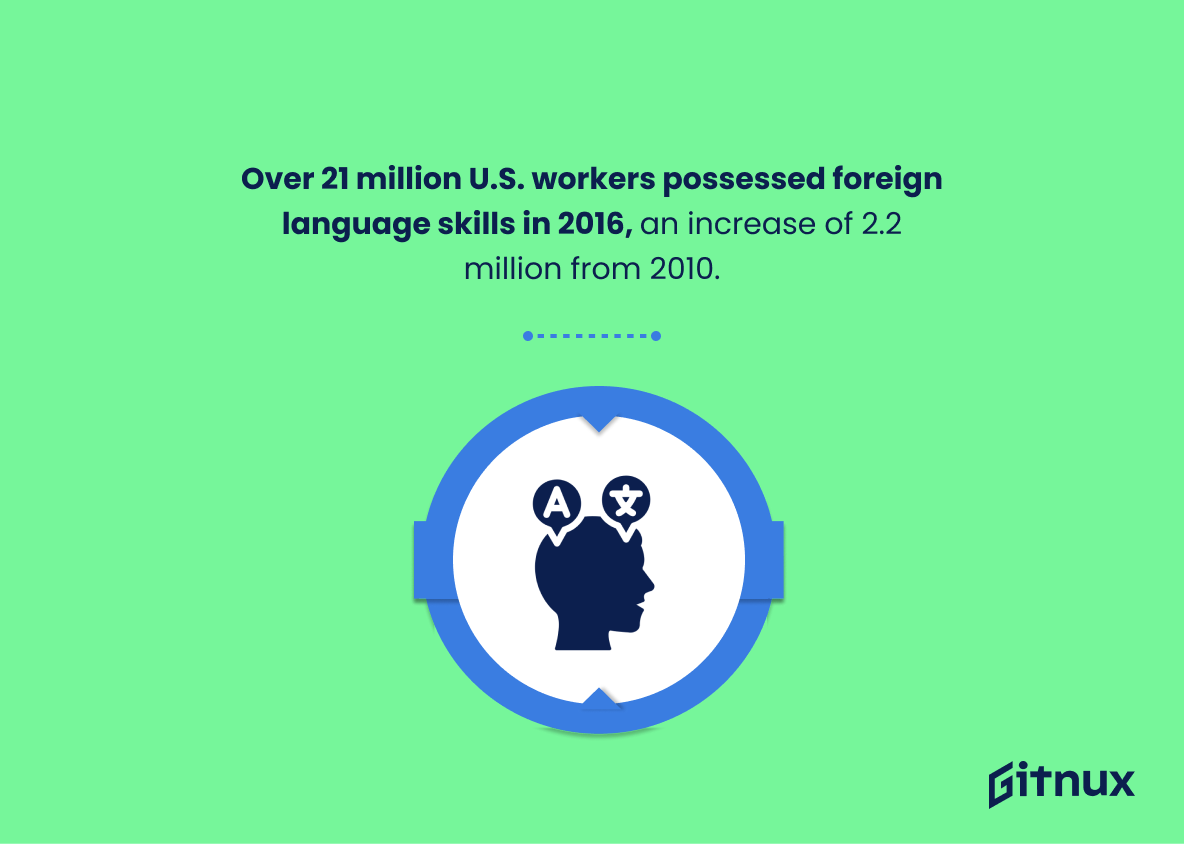The bilingual job market is growing rapidly, and the demand for bilingual workers is on the rise. As a result, bilingual employment statistics are becoming increasingly important for employers and job seekers alike.
In this article, we will take a look at the latest bilingual employment statistics and discuss how they can help employers and job seekers make informed decisions about their career paths. We will also explore the benefits of bilingualism in the workplace and discuss how employers can use bilingual employment statistics to their advantage.
Bilingual Employment: Most Important Statistics
The demand for bilingual workers has increased significantly over the past five years, with 60% of the jobs with the highest demand open to individuals with less than a bachelor’s degree.
The number of bilingual people in the US is rising, with over 630,000 job advertisements in 2015 requiring the ability to speak a second language.
Bilingual Employment: Statistics Overview
States are expanding dual language education programs to meet the rising demand for multilingual workers, as employers prefer hiring bilingual staff for a variety of sectors.
Employers are increasingly looking for bilingual staff, and states are responding by creating and expanding dual-language programs to meet this demand.
This is beneficial for both employers and job seekers, as it provides more opportunities for bilingual individuals to find employment.
The demand for bilingual talent is increasing in major industries in the US, which is important for providing services with a high degree of human interaction.
Employers are increasingly recognizing the value of bilingual workers, and that bilingual workers are in high demand in certain industries.
This could lead to increased job opportunities for bilingual workers and better job security for those already employed in these industries.
Spanish is relatively easy to learn, but there are a lot of native speakers in the US; Russian is a major player on the world scene and not many people have it. Mandarin Chinese is difficult but is becoming increasingly important due to the economic power of China.
This matters in the context of bilingual job statistics in the US as demand for Chinese speakers has tripled in the last five years, while demand for Spanish and Arabic has doubled, showing that language skills are becoming increasingly important in business.
Spanish is the third most spoken language in the world, with over 500 million speakers, including 470 million native speakers and 100 million non-native speakers.
French is the official language in 29 countries and has 75 million native speakers and 229 million non-native speakers. This matters in the context of bilingual employment statistics because job demand for bilingual speakers is growing.
The demand for bilingual workers has increased significantly over the past five years, with 60% of the jobs with the highest demand open to individuals with less than a bachelor’s degree.
There is a growing demand for bilingual workers in the United States, and that individuals with less than a bachelor’s degree are able to access these jobs.
This could open up opportunities for individuals who may not have had access to these jobs previously.
The number of bilingual people in the US is rising, with over 630,000 job advertisements in 2015 requiring the ability to speak a second language.
Employers are increasingly recognizing the value of language skills in the job market and are actively seeking out bilingual employees.
This trend is likely to continue as more businesses engage in international trade, making language skills an increasingly valuable asset for job seekers.
Being bilingual can increase earning potential by 5-20% per hour if you are asked to act as a translator or interpreter on the job, especially if there is a shortage of employees who can translate.
Bilingualism can be a valuable skill in the job market, allowing individuals to stand out and earn more.
Bilingual employees earn an average of 2-3.8% more than monolingual employees, which can add up to an extra $67,000 in retirement savings.
Bilingual employees are more likely to be rewarded financially for their language skills, which can have a significant impact on their long-term financial security.
13 jobs for bilingual individuals are available in various industries.
This highlights the fact that there are many job opportunities available to bilingual individuals in various industries.
This demonstrates the value of bilingualism in the job market and shows that employers are increasingly seeking to hire bilingual candidates.
Bilinguals are in high demand in today’s job market, with career options such as Translator/Interpreter, Customer Service Representative, Hospitality Manager, Human Resources Specialist, and Flight Attendant.
Employers are actively seeking out bilingual individuals for various job roles. This highlights the importance of being bilingual in today’s job market, and demonstrates the potential for bilingual individuals to find success in their career.
Supplementary Statistics
In 2016, bilingual workers accounted for 34% of the global outsourcing workforce.
This demonstrates that bilingual workers are in high demand, and that employers are increasingly recognizing the value of having employees who can communicate in multiple languages. This statistic is especially relevant to a blog post about bilingual employment statistics, as it provides a concrete example of the prevalence of bilingualism in the workforce.
The demand for bilingual talent in the U.S. rose by 14% between 2016 and 2019.
Employers are increasingly recognizing the value of bilingual employees and are actively seeking out talent with language skills. This trend is likely to continue, making bilingualism an increasingly important asset for job seekers.
In 2020, 75% of employers in the U.K. valued foreign language skills, particularly the ability to be bilingual.
Employers are increasingly recognizing the value of bilingualism, and are actively seeking out candidates with these skills. This is an important trend for job seekers to be aware of, as it could give them a competitive edge in the job market.
66% of U.S. employers offered incentives or rewards to encourage employees to learn a second language.
This is a clear sign that bilingualism is becoming increasingly important in the job market, and is something that job seekers should take into consideration when looking for employment.
Over 21 million U.S. workers possessed foreign language skills in 2016, an increase of 2.2 million from 2010.
More and more employers are recognizing the value of having employees who can speak multiple languages, and are actively seeking out workers with these skills. This is a trend that is likely to continue, as the global economy becomes increasingly interconnected and businesses look for ways to expand their reach.
61% of hiring managers say that knowing at least two languages is increasingly important in today’s working world.
Having knowledge of two languages is becoming increasingly essential for job seekers, and that employers are actively seeking out candidates with this skill set. This statistic is an important piece of evidence to include in a blog post about bilingual employment statistics, as it provides a clear indication of the importance of bilingualism in the current job market.
The European Union now has over half of its population speaking at least two languages fluently.
With over half of its population speaking two languages fluently, the EU is a prime example of how bilingualism can open up a wealth of opportunities in the job market. This is especially relevant when considering the bilingual employment statistics, as it demonstrates the potential for individuals to gain an edge in the competitive job market by having a mastery of two languages.
Bilingual employees in administrative positions can exercise salary premiums of up to 20%.
Bilingual employees can command higher salaries for their skills, and that employers are willing to pay a premium for bilingual employees in administrative positions. This is an important point to make in a blog post about bilingual employment statistics, as it demonstrates the tangible benefits of bilingualism in the workplace.
The U.S. Army has approximately 17,000 bilingual and polyglot soldiers.
The Army recognizes the value of having personnel who can communicate in multiple languages, and is actively recruiting and training bilingual and polyglot soldiers. This highlights the need for bilingualism in the workplace, and the potential benefits it can bring to employers.
In Canada, Bilingual employees earn an average of $7,100 more per year than their monolingual counterparts.
Employers are willing to pay a premium for employees who can communicate in more than one language, and that bilingual employees are more likely to be rewarded financially for their skills. This is an important point to consider when discussing bilingual employment statistics, as it highlights the potential benefits of being bilingual in the job market.
Bilingual employees occupy 66.3% of customer service positions in the United States.
A large majority of customer service positions are filled by bilingual employees, demonstrating the need for bilingualism in this field. This statistic is a testament to the value of bilingualism in the workplace and the importance of having a diverse workforce.
47% of U.S. employers faced difficulty recruiting bilingual candidates in 2019.
Many employers are struggling to find bilingual candidates, which could be due to a lack of qualified applicants or a lack of awareness of the need for bilingual employees. This statistic is an important reminder that bilingualism is an increasingly valuable asset in the job market and that employers should be actively seeking out bilingual candidates.
Bilingual employees are considered to be more efficient, with a 22% increase in efficiency in a study of insurance claim processors.
This is an important point to consider when discussing bilingual employment statistics, as it highlights the potential benefits of hiring bilingual workers.
94% of U.S. companies reported they had a language skills gap on their multilingual teams in 2019.
This highlights the need for companies to invest in language training and development for their multilingual teams in order to ensure they are able to effectively communicate with each other and with customers. It also serves as a warning that without the necessary language skills, companies may be missing out on potential opportunities and may be unable to compete in a global market.
Conclusion
In conclusion, bilingual employment statistics are an important indicator of the value of bilingualism in the workplace. The data shows that bilingual employees are more likely to be employed, earn higher wages, and be more successful in their careers.
As the world becomes increasingly globalized, bilingualism is becoming increasingly important in the workplace. Companies should recognize the value of bilingualism and make efforts to hire and promote bilingual employees.
References
1 – https://www.newamerica.org/education-policy/edcentral/new-research-examines-economic-benefits-bilingualism/
2 – https://www.newamericaneconomy.org/press-release/demand-for-bilingual-workers-more-than-doubled-in-5-years-new-report-shows/
3 – https://www.findabusinessthat.com/blog/3784/bilingual-job-statistics-how-many-employers-want-bilingual-employees/
4 – https://www.flexjobs.com/blog/post/bilingual-job-opportunities/#:~:text=The%20Top%20Foreign%20Languages%20to%20Consider%20Learning%20For,3.8%25.%20.%204%20Mandarin%20.%205%20Arabic%20
5 – https://www.newamericaneconomy.org/press-release/demand-for-bilingual-workers-more-than-doubled-in-5-years-new-report-shows/
6 – https://www.findabusinessthat.com/blog/3784/bilingual-job-statistics-how-many-employers-want-bilingual-employees/
7 – https://www.uei.edu/blog/can-speaking-two-languages-increase-your-job-prospects/
8 – https://www.findabusinessthat.com/blog/3784/bilingual-job-statistics-how-many-employers-want-bilingual-employees/
9 – https://www.indeed.com/career-advice/finding-a-job/jobs-for-bilingual
10 – https://www.berlitz.com/blog/best-careers-for-bilinguals
11 – https://www.languagetrainers.co.uk
12 – https://www.army.mil
13 – https://www.statista.com
14 – https://hbr.org
15 – https://europa.eu
16 – https://globalnews.ca
17 – https://learn.g2.com
18 – https://www.european-business.com
19 – https://www.businesswire.com
20 – https://www.shrm.org
21 – https://www.roberthalf.com


